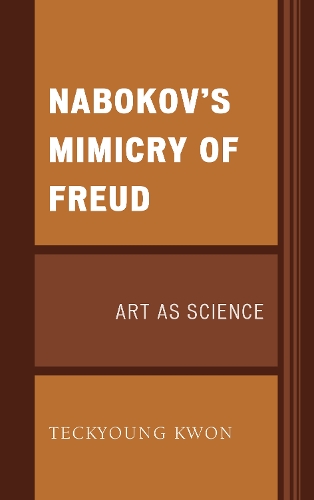
Nabokov's Mimicry of Freud: Art as Science
(Paperback)
Available Formats
Publishing Details
Nabokov's Mimicry of Freud: Art as Science
By (Author) Teckyoung Kwon
Bloomsbury Publishing PLC
Lexington Books
23rd May 2019
United States
Classifications
Professional and Scholarly
Non Fiction
Fiction: literary and general non-genre
Psychotherapy
818.5209
Physical Properties
Paperback
200
Width 154mm, Height 221mm, Spine 15mm
308g
Description
In Nabokovs Mimicry of Freud: Art as Science, Teckyoung Kwon examines the manner in which Nabokov invited his readers to engage in his ongoing battle against psychoanalysis. Kwon looks at Nabokovs use of literary devices that draw upon psychology and biology, characters that either imitate Freud or Nabokov in behavior or thought, and Jamesian concepts of time, memory, and consciousness in The Defense, Despair, Lolita, Pale Fire, and Ada. As Kwon notes, the transfiguration of biological mimicry and memory into an artistic form involves numerous components, including resemblance with a difference, contingency, the double, riddles, games, play, theatricality, transgression, metamorphosis, and combinational concoction. Nabokov, as a mimic, functions as a poet who is also a scientist, while his model, Freud, operates as a scientist who is also a poet. Both writers were gifted humorists, regarding art as a formidable vehicle for the repudiation of all forms of totality. This book is recommended for scholars of psychology, literary studies, film studies, and philosophy.
Reviews
One of the intriguing mysteries of Nabokov scholarship is the novelist's well-known detestation of Sigmund Freud, the Viennese "witch doctor." Teckyoung Kwon casts much light on this question, reaching the surprising conclusion that Freud seems to play an "almost collaborative role" in Nabokov's art. A fascinating book. -- Jeffrey Berman, University at Albany, SUNY
Why did Nabokov, well-known for his rants against Freud and psychoanalysis, present Lolita as the parody of a psychoanalytic case history which details the passion of an adult for an underage nymphet, while Ada, the novel of his maturity, unpacks a tale of brother-sister incest Reading Nabokov and Freud side by side with the help of Darwin, James, Ouspensky, and Lacan, Teckyoung Kwon astutely explains the Russian writer's antipathy toward the psychoanalyst as aggressive mimicry. Those rivals, both scientists and poets, work against each other and with each other, offering their reciprocal self-portraits in a distorting mirror. Nabokovs uncanny proximity to psychoanalysis is analyzed with verve and subtlety by one of the masters of South Korean literary criticism. Her book, the first to present a systematic study of Nabokov and Freud, will revitalize our interest in Nabokov and deepen our understanding of the links between literature and psychoanalysis. Jean-Michel Rabat, University of Pennsylvania -- Jean-Michel Rabat, Professor of English and Comparative Literature at the University of Pennsylvania
Taking the concept of mimicry as her Ariadnes thread through the labyrinth of Nabokovs work, Teckyoung Kwon traces the far-reaching affinities between his twin passions for lepidopterology and literature, and in the process exposes the hidden resemblances that lie beneath Nabokovs loudly proclaimed antagonism to Freud. This deeply learned study is itself a feat of consilience that recalibrates our understanding of Nabokov by viewing his imaginative universe through the binocular lenses of art and science, philosophy and psychoanalysis. -- Peter L. Rudnytsky, University of Florida
Author Bio
Teckyoung Kwon is professor emerita of English at Kyung Hee University.
